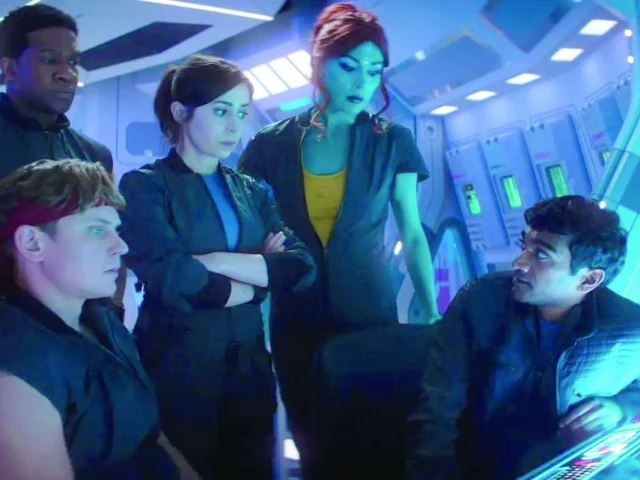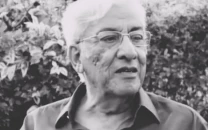'Black Mirror': Back into the bleak-hole
'Black Mirror' season 7 goes back to its signature pessimism

With the dystopian horrors that currently form our waking reality, one could have easily mistaken it for Black Mirror's latest season. Yet Charlie Brooker thought it best to resume his culture-changing anthology series and release the seventh season this past Thursday.
The last few lacklustre seasons shifted from the original Black Mirror tone. They missed the show's signature bleakness and the post-show disgust that you felt as you stared at yourself in the black mirror as the credits rolled. That bitter aftertaste is back in season 7.
I intended to write '... and the world rejoices'. But I find it quite tragicomical that our appetite for horrors of our lives filtered through a screen has only increased with years. It's frightening how Black Mirror is not a show portraying the futuristic tech-horrors, commenting on our civilisation's inevitable doom and warning us of our collective failures, but rather almost a reality TV show narrating the events of our present-day lives.
All this to say that if it triggers these nihilistic thoughts in yours truly, Black Mirror's welcome return to the bleak-hole, where all tesseracts display our doom, is largely successful.
Episodic breakdown
The season, which consists of six episodes, starts off with a bang with Common People. It's the only episode in the season which has a similar impact to the show's first ever episode The National Anthem. In terms of plot and structure, it reminds you of second season's Be Right Back with the gender roles reversed.
Criticising the increasingly ridiculous subscription culture, Common People revolves around Amanda whose brain tumour puts her in a coma and the only treatment is a radical one by a new company Rivermind, which replaces her lost brain tissue with a synthetic one and for a monthly fee, the damaged brain functions are transferred wirelessly from a server. However, the subscription models require upgrading for benefits – more area coverage, no ads (otherwise Amanda quite literally speaks advertising messages mid-conversation) and a relatively normal sleep cycle during which the brain "gives back to the grid".
Pepperidge Farm remembers the good ol' days when, once you bought something, you owned it and didn't have to pay for it every month. But even softwares and apps use subscription models now. And so, the thought of your own brain being leased on a subscription is terrifying to an infinitieth degree.
The heartbreaking ending to the episode aside, it also one-ups the idea of intrusive ads surrounding us, which the show explored in Fifteen Million Merits, the second episode of the first season. Here, you are a walking advertisement.
The second episode, Bête Noire, stands out with its slow burn horror pace and Rosy McEwen's incredible performance. A tale of revenge set in a chocolate company, it is arguably one of the best written episodes. The dialogue, narrative progression and the pace just flows as smoothly as marble on an ice rink. The ending is right out of a Coralie Fargeat film, if she was forced to set a revenge story in a corporate office.
If Common People broke your heart, Eulogy stomps on your shattered heart and throws it back in your face. Paul Giamatti, in a beautiful performance, stars as a bitter, angry old man who has never forgiven his deceased ex-girlfriend. For her funeral, he is contacted to offer a memory for her eulogy. It wouldn't be Black Mirror if the characters' lives weren't disrupted by a new tech. And so, the new AI allows people to virtually transport themselves inside photographs and roam around. Throughout the episode, Giamatti uses it to remember and find a suitable memory of his ex to be shared at her funeral.
Plaything presents an interesting concept akin to growing our own SIMS and caring more about the virtual beings than fellow humans, but a flawed and mediocre ending does the episode no justice. However, it does offer Will Poulter reprising his Black Mirror: Bandersnatch role as the gamer Colin Ritman in a sweet little easter egg.
Hotel Reverie is one of the two feature-length episodes in the season. It feels like a spinoff of The Twilight Zone's The Sixteen-Millimeter Shrine where a has-been actress replays her old films 24/7 and wishes to be transported permanently into the reel world. In Hotel Reverie, a young Hollywood star Brandy Friday also wishes for the same – to dive into a magical world. She gets the opportunity when she's cast in a remake of a classic romantic film. The caveat is that the film will be shot in real-time as her consciousness is fed into an AI-created virtual world of the story. Brandy soon realises that certain AI story characters have more agency than expected.
It's an intriguing episode. It draws on the contemporary remakes of iconic films where the gender roles are reversed. In the remake of the classic film, the role of the male protagonist Alex is replaced by a black woman Brandy but the story remains the same. Brandy is told not to worry since the AI characters, including Alex's love interest Clara, are programmed to not notice the difference.
By mocking the ridiculousness of this trend, it inadvertently creates new wonderful female characters in a complete and emotionally satisfying story. Brooker here definitely suggests creating original characters instead of rehashing old ones and swapping genders for the heck of it, as is the trend in Hollywood.
The season finale USS Callister: Into Infinity is the first direct sequel in Black Mirror. While it was a much-anticipated return to the Star Trek-inspired world, the sequel falls slightly short of being as impactful as the rest of the season. The plot becomes convoluted just to maintain interest and the ending has a major plot hole which leaves you underwhelmed. But hey, it sets up the possibility for a threequel.
Aftertaste
When Brooker called it going back to the OG Black Mirror roots, he wasn't kidding around. The seventh season undoubtedly brings the feeling back. Despite a somewhat underwhelming finale and a miss, the overall quality is significantly better than the last season.
Brooker realised that his newfound optimism didn't fit the bleak universe of the show and returned to what he did best. Mind you, it's not saying "technology is bad" but rather how we use it. By seeing certain characters return, some easter eggs, homages and universe expansions, Black Mirror S7 gives you a semblance of happiness amidst a catastrophic existence. Be it via AI or not, we could very well be the first generation who'd find comfort in our impending doom, since Black Mirror familiarises us with it beforehand.
Have something to add to the story? Share it in the comments below.



















COMMENTS
Comments are moderated and generally will be posted if they are on-topic and not abusive.
For more information, please see our Comments FAQ